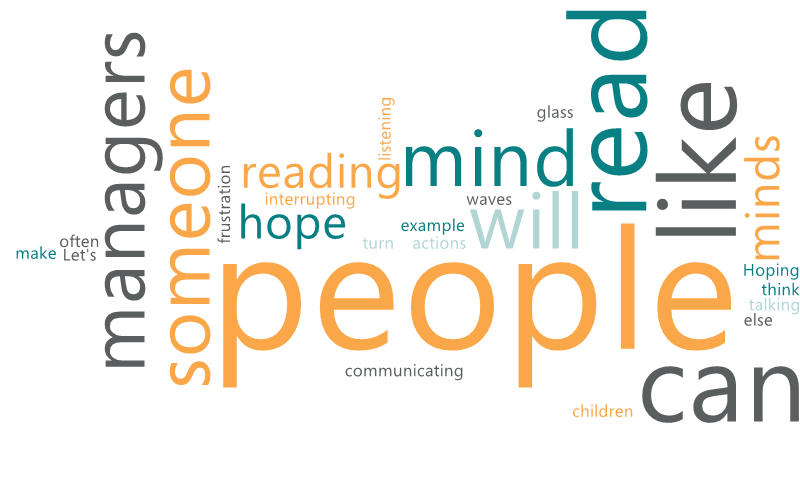|
"Torn by hesitation, we often make decisions that lead to new doubts."
- Sylvia Crystal Many managers enter the corridors of misunderstood diplomacy, keeping silent about things they disapprove. But yet they hope that the surrounding people will read their minds and correct themselves. This self-regulation might happen sometimes. But it most often occurs in managers' dreams. Not in the real world. Hoping that someone will read your mind and come up with a solution to a problem that bothers you is as probable as turning a spring rain into a Morse poem. With few exceptions, most people cannot read minds. Most people understand their managers' messages as soon as they turn them from thought waves into vocal waves. Although mind reading is not widespread, the hope that someone else will apply it and read your mind is. No one can read your thoughts, for example, that you don't like someone being late, interrupting you, looking at your phone while you're talking to him, having a dirty glass in the kitchen, talking loudly, etc. What causes frustration among managers is not the actions mentioned above, but that the people they work with do not think of interrupting them themselves. The frustration comes from having to have such conversations—more than once. These actions irritate you that can turn from a source of irritation into a source of improvement and structure. But not like anyone else has changed. And as you go from a king of silence to a naturally communicating manager. But communicating in a particular way - speaking and listening-is in the proportion suggested to us by nature - twice as much listening. The opposite of this "hope of reading my mind" is direct communication. It turns out to be simple. But not always easy. The only reason it's difficult for you is because of the stories you tell in your head. The story that if you make a remark, you can hurt someone. No one can be offended without his consent. Let's use a specific example. Let's say your colleague leaves his cup of coffee in the kitchen unwashed. Instead of telling him to wash his glass directly, it would be better first to help him realize what it would mean for the entire floor if a hundred people left their glasses like that until 10.30 in the morning. The people on your teams are smarter than you think. You don't have to treat them like little children because that would lead to people behaving like 35-year-old children. However, before asking questions, check whether you can ask them with a supportive rather than a judgmental and sarcastic attitude. Because: The highway of sarcasm will take you to the city of apathy.
0 Comments
Leave a Reply. |
Архиви
July 2024
|
__________________________________________
Copyright © 2011-2024, Equinox Partners Ltd. All rights reserved.
Copyright © 2011-2024, Equinox Partners Ltd. All rights reserved.


 RSS Feed
RSS Feed


